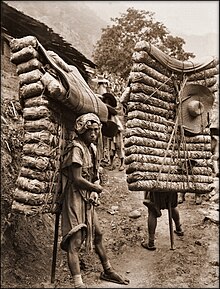
Back عتال Arabic Gepäckträger (Beruf) German Porteur (métier) French סבל (מקצוע) HE Pramuantar ID Portatore (mestiere) Italian ചുമട്ടുകാരൻ Malayalam Drager (goederen) Dutch Berar NN Ganhador Portuguese
This article includes a list of general references, but it lacks sufficient corresponding inline citations. (May 2009) |



A porter, also called a bearer, is a person who carries objects or cargo for others. The range of services conducted by porters is extensive, from shuttling luggage aboard a train (a railroad porter) to bearing heavy burdens at altitude in inclement weather on multi-month mountaineering expeditions. They can carry items on their backs (backpack) or on their heads. The word "porter" derives from the Latin portare (to carry).[1]
The use of humans to transport cargo dates to the ancient world, prior to domesticating animals and development of the wheel. Historically it remained prevalent in areas where slavery was permitted, and exists today where modern forms of mechanical conveyance are impractical or impossible, such as in mountainous terrain, or thick jungle or forest cover.
Over time slavery diminished and technology advanced, but the role of porter for specialized transporting services remains strong in the 21st century. Examples include bellhops at hotels, redcaps at railway stations, skycaps at airports, and bearers on adventure trips engaged by foreign travelers.
© MMXXIII Rich X Search. We shall prevail. All rights reserved. Rich X Search